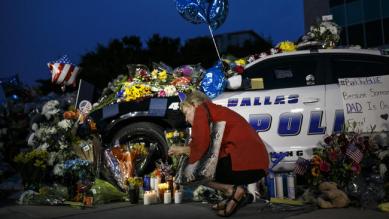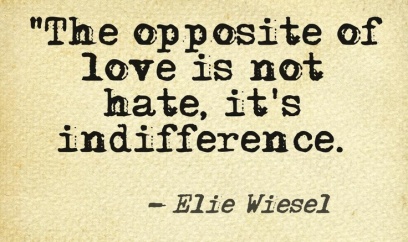
Sometimes preachers can begin preparing their sermon too early. I began working on this sermon more than a week ago. I chose the theme, the point and the title of the sermon early Tuesday morning.
As you can probably tell by the title of my sermon, “Do This and Live,” the point of my message this morning was going to be that it is high time for Christians to put our faith into action.
In the beginning of Luke 10, we read Jesus saying to seventy of his followers: “the harvest is plentiful but the laborers are few.” Then he commissions them to do some pretty big things: bring peace to the people, cure the sick, work to bring the kingdom of God near.
This was going to be my sermon.
I was going to tell the story of the Good Samaritan, tell how he overcame his fear of the other, how he reached out and reached down to help him in his time of distress, and then I was going to quote Jesus, by saying: “Go and do likewise.” “Do this and live.”
I was going to say that it is time for us act, to go and do likewise.
I was going to say that the Samaritan did not merely wish the man lying in the ditch well. He did not just send his thoughts and his prayers. He didn’t mull over the situation, consider the risk involved, ask whether or not his insurance would cover it. He just acted.
I was going to encourage you to be the church that Shannon often describes as one that is “on the move.”
I was going to admonish you to move beyond thoughts and prayers, study and contemplation, to be more committed than ever to truly be a movement for wholeness in this fragmented world.
A movement. Not a team of thinkers.
A movement. Not philosophy class.
A movement. Not a club of theorists.
A movement. Not a group of day dreamers.
A movement. Not a church of well-wishers.
A movement, a body of doers, doing all that we can, when we can, with all that we have been given,
working for wholeness in a creation that is broken,
working for justice in systems of inequality,
working for mercy and grace in a society of bigotry and prejudice,
working for peace in a culture of war and violence,
working for truth in a nation of politics,
working for love in a world of hate,
working for hope in a world of despair.
However, after the horrific events continued to unfold this week, I went back to our scripture lesson to read it once more in the light of what has been a horrendous week for our country.
Surely, God has something else to say to us this week.
The first time I read the story, I read it the way many read it. By understanding that God wants us to see ourselves in that Good Samaritan, that God wants us to overcome our fear of the other and act to truly love others as we love ourselves. God wants us to courageously go out, reach out and reach down to help those who have been left behind, put down, beaten up.
But after a week in which we witnessed 250 murders in Baghdad, the murder of two African Americans in Baton Rouge and St. Paul, and the murders of five police officers in Dallas, I began to read the text differently.
Instead of seeing ourselves in that Good Samaritan, perhaps God needs us to acknowledge today that we are more like one who has been robbed, beaten, and left bleeding, half-dead in a ditch on the side of a wilderness road.
That is where I believe we truly are as Americans today. We have been robbed: robbed of pride and dignity, robbed of trust and hope, and robbed of peace and security. We have been beaten: beaten by racism and hate, beaten by terrorism and violence, and beaten by confusion and despair. And we are bleeding. We are bleeding tears, bleeding fear, and bleeding anger.
And honestly, we are currently unable to act sensibly, unable to move courageously, and certainly unable to be any semblance of a movement for wholeness, because we ourselves are not whole. We are broken, barely making it, not knowing whether we might live or die.
And one by one, people are passing us by. Friends are disappointing us, and even people of faith are letting us down. We are being treated as if our lives do not matter.
But here is the good news:
The good news is that someone is coming towards us. Someone is coming very near to us. Although we cannot comprehend it, we sense his presence.
He is but a stranger to us. His ways are not our ways. He comes from a foreign land. He is one who has been despised and rejected by the world, a man of sorrows held in low esteem.
But when this strange one sees us, as he becomes acquainted with our suffering, he is immediately moved with compassion. He is moved thoroughly and deeply.
We have been beaten so badly, he does not recognize if we are black or white, Jew or Muslim, male or female.
Yet, he suffers with us, and he suffers for us. His empathy towards us brings him down to his knees. We can feel his warmth. We perceive his empathy. And then, kneeling beside us, with his own hands, he tends to the places where we have been hurt. He stops the bleeding. He cleanses our lacerations. A costly wine poured out. Carefully, attentively and lovingly, he bandages all of our wounds.
He then puts his arms around us. Although we still cannot make out his face, cannot comprehend his actions, we instinctively know that we can trust him. We can trust him. So we put hands around his neck as he picks us up.
He picks us up and carries us until we reach a safe place, a place where no one judges us, a place where we are welcomed and accepted just as we are.
He stays beside us and continues to care for us. He gives us warm bread and something refreshing to drink. He stays with us through the darkness of the night, holding us, loving us, assuring us that we will not only have life, but we will have life abundantly, assuring us that a new day will dawn and we will be a part of it.
And when that day comes, he sacrificially pays the price for our care, for our healing, for our salvation. And then he places us in the hands of others who will care for us, shepherd us, love us as he loved us.
He then tells us that he must go, but before he departs, he makes a promise. I will come again. I will surely come again, and whatever your debt may be, I will take care of it. I will pay it in full. I will forgive it fully, completely. Grace will be yours not only today, but forever.
And our cups runneth over. We are healed, made whole. We have been saved. For we have never experienced such a love, a love without conditions, a grace without limits, a mercy without reservations.
This afternoon, our church is partnering with Youth and Family Services to host a back to school bash for foster children living here in Garfield County. We will have games, provide haircuts, and give out book bags with school supplies. Most of all, we will give them our love.
We will let them know that today they come to a safe place. A place where no one will judge them, a place where they will be accepted and welcomed.
We will let them know that there is a community here that will hold them, love them unconditionally, share mercy with them unreservedly, and offer grace to them with no strings attached whatsoever.
We are not going to merely offer these foster kids our thoughts and prayers. We are not going to just wish them well. We are going to act.
And we are going to continue these acts of grace with others in our community who find themselves in need. We are truly committed to be a church on the move.
However, before we can do this, before we can be a body of doers, before we can go and hold others in the light of Christ, a light that will certainly drive away the darkness, I believe we first need to be held in that light ourselves.
Before we can envelop others with a love that will drive out the hate, we first need to know that we have been embraced by such a love. Before we can become a movement for wholeness, we first need to be made whole.
And if we do this, accept this love, receive this grace, allow this mercy to take a hold of us, pick us up, heal us, redeem us, and transform us, if we do this, we will live.
And then, we can share this life with others. We can truly be a movement for wholeness in a fragmented world.
Come, Lord Jesus. Come quickly.

